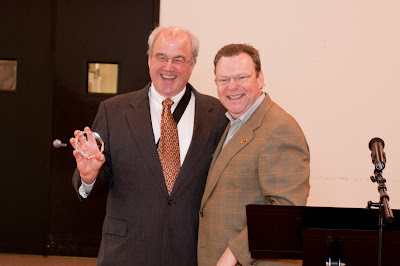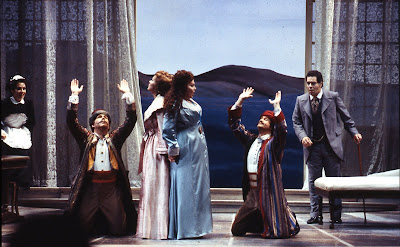The Atlanta Opera Honors its Volunteers
The gift of time and expertise is just as valuable as a monetary gift. Last year, Atlanta Opera volunteers contributed more than 6,000 hours! Volunteers help keep costs low and help us fulfill our mission of presenting world-class opera productions, while fostering education about this important art form.
There are many volunteer opportunities for opera-lovers in the Atlanta-area. Some are more traditional responsibilities including assisting with mailings, receptionist duties, filing, assistance at special events like Opera 101, Opera Chat, and Final Dress Rehearsals, but we also offer uncharacteristic opportunities that let our volunteers experience the day to day aspects of mounting an operatic production. Volunteers are needed to meet visiting artists at the airport and take them to their residences. This is often an artist’s first introduction to the city and The Atlanta Opera. After the set is loaded into the theatre, volunteers are needed to help set the light cues. The task involves standing and moving around on stage following the lighting director’s instructions as the cues are set. Volunteers are also asked to help monitor and coordinate chorus and principal auditions, which is always a thrill for opera lovers!
The Atlanta Opera also has an extensive archive full of historical data, media coverage, marketing materials, programs, and recordings. Volunteers review online and print media, clip, copy, catalog, and work with various departments to file company pieces that should be added to archival records. This incredibly important and time consuming responsibility is spear headed by Mary Ruth McDonald, who has created a comprehensive and organized archive that The Atlanta Opera can use as a resource, and that can ensure our legacy is properly preserved. At this year’s Volunteer Reception, we presented Mary Ruth with the Rachel Rosen Lehmann Award for her time and devotion to The Atlanta Opera.

Zurich General Director Dennis Hanthorn names Mary Ruth McDonald as recipient of the Rachel Rosen Lehmann Award. Credit: Tim Wilkerson.
In this age of digital media, The Atlanta Opera has changed a lot of its focus to how to reach audiences through social media and videos that inform and educate about opera. With the unfaltering dedication of board member and volunteer, Stewart Searle, who films, produces and post-produces all of our videos, we have expanded our online video library to comprehensively educate and inform the public using many forms of media – music, audio, and video. To date, we have had over 30,000 page views to our website! For Stewart’s incredible dedication he was presented with special recognition for his tireless efforts on behalf of The Atlanta Opera.

Stewart Searle (left) receives special recognition for his tireless work on The Atlanta Opera Video Library. Credit: Tim Wilkerson.
We, like all organizations, are understaffed for many projects that require a keen eye for detail and extra time, so we are especially grateful when a volunteer can step in and help us with incredibly important and necessary organizational work. It is not glamorous work, and it is not thrilling work, but it helps us stay organized and allows us to have quick access to information. Our 2010-2011 Volunteer of the Year, Denise Andersen, helped us with extensive filing and organizational projects that we would never have been able to do alone. She accumulated the most hours donated to The Atlanta Opera! For her time we are infinitely grateful.

Staff members Stephanie Cantillo (left) and Rae Weimer (right) congratulate Denise Andersen (center) on being the 2010-11 “Volunteer of the Year.” Credit: Dallas Duncan.
Often we forget that Board Members are also volunteers. We have an exceptional board that devotes its time and resources to ensuring the future of this beloved organization. This year, we honored board member Dr. John O’Shea with the Rachel Rosen Lehmann Award for Outstanding Leadership in Fundraising. Dr. O’Shea continues to host cultivation lunches with donors, make telephone calls to thank patrons for their generous donations, and he also makes solicitation calls. Dr. O’Shea leads by example. He and his wife, Clara, are major donors to The Atlanta Opera and his passion for the art of opera and his belief in doing good things has benefitted The Atlanta Opera in more ways than can be measured. For his devotion and involvment, we are most grateful.

John O’Shea, and his wife Clara. Credit: Tim Wilkerson.
Thank you to all of our volunteers for their dedication to the art that sings. They are The Atlanta Opera’s uncompensated staff and more importantly, members of the opera family!
























